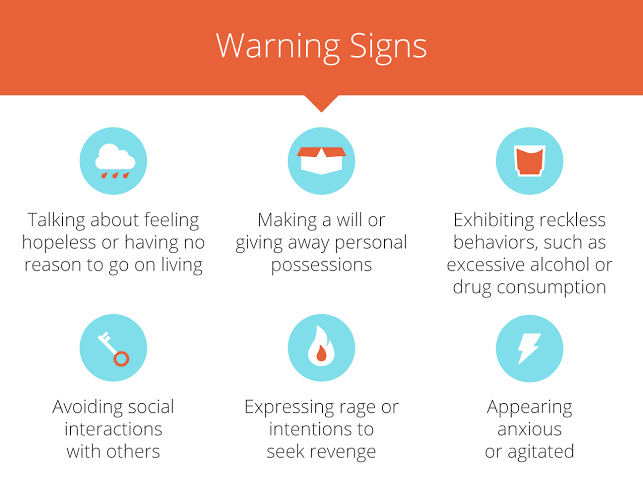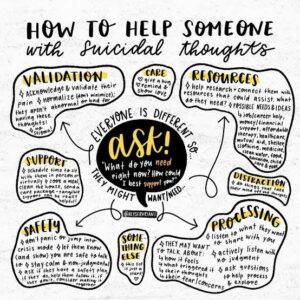We all experience pain. We all experience suffering. Many of us have experienced trauma one way or the other way. And that can consume you.
Each and every one of us has had suicidal thoughts at some point in our lives. It is much more common than we think. News reports show only 1% of the number of suicides that occur-depending on the country the percentage could be higher or lower. Whether it stems from not being able to cope in certain situations, chronic depression- which in some cases is hereditary-, or from having suffered a traumatic experience in our lives, it shows up.

There is no “typical suicidal person”. However, there are several behaviors that can indicate that a person is seriously considering suicide. These include:
· Talking about committing suicide and preoccupation with death and dying
· Trouble eating and sleeping and noticeable change in personal appearance
· Loss of interest in work, school or hobbies and withdrawal from social activities, friends and family
· Experiencing or expecting a significant personal loss (spouse or other)
· Drastic change in behavior, often taking unnecessary risks as if they didn’t care what happened
· Increased use of alcohol and drugs
· Signs of preparing for death-making funeral arrangements or giving away prized possessions
· The most significant indicator is the expression of suicidal intent
Any combination of these actions might alert both family and friends that a person is struggling with life and considering suicide as an option.
There is no investment whatsoever in schools to help kids and adolescents to deal with their emotions, hence we as grown-ups are doing the best we can. It is ok to ask for help.

One of the most important things that you can do if someone you care about, talks about suicide is to remain calm and listen to that person. Remember that people who are feeling suicidal isolate themselves, so reaching out to them is vital. They need you to encourage them to talk and then they need you to listen carefully. Other important things to keep in mind include:
· Talk openly and directly about suicide. Use the words like “suicide”, “kill yourself”, and “dead” in a clear way.
· Don’t be judgmental and accept the person’s feelings, even if you disagree with them. Don’t get into a debate as to why they should stay alive, or whether suicide is right or wrong; your arguments won’t help and the suicidal person might tune you out.
· Show your interest and support. Don’t let the person swear you to secrecy. It’s unfair of them to ask you to do so.
· As a person tells you that he or she is thinking about suicide, start thinking about people you can ask for help. You can do a lot to help the person initially, but the situation is too dangerous to handle entirely on your own. Your best source of help will ultimately be a mental health professional, most likely a therapist, who has the knowledge and training to give the suicidal person the assistance they needed.
We are not superhumans- we are humans, and as such, we help one another. Nothing makes a person happier than to help out. We might not be able to solve whatever problem one may be going through, but it really helps to talk about it.





I don’t think the title of your article matches the content lol. Just kidding, mainly because I had some doubts after reading the article.
Your point of view caught my eye and was very interesting. Thanks. I have a question for you.